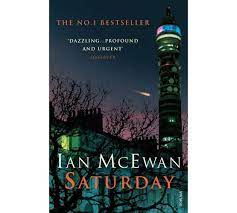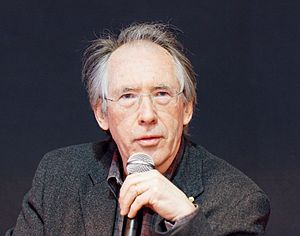
© Vintage
“The butcher boy gets a bauble,” was my reaction to the news that former UK Prime Minister Tony Blair was to be made ‘a Knight Companion of the Most Noble Order of the Garter’, whatever that means, in the Queen’s New Year Honours List. I call Blair ‘the butcher boy’ because of his role in the invasion of Iraq, which happened during his watch in 2003. The invasion was launched to depose Saddam Hussein who, it was claimed, possessed Weapons of Mass Destruction. However, these WMDs turned out to not actually exist and it became obvious that Blair and his invasion partner George W. Bush had spun a web of lies beforehand to make people believe that they did.
And it wasn’t just the WMDs that didn’t exist. Since the invasion took place, up until the beginning of 2021, due to ‘coalition and insurgent military action’ and subsequent ‘sectarian violence and criminal violence’, between 185,000 and 209,000 Iraqi civilians are estimated to have stopped existing too – their deaths the direct and indirect results of Blair and Bush’s actions.
Actually, I’d been thinking about Tony Blair and Iraq before word came through of Blair’s ennoblement, because late last year I read Ian McEwan’s 2005 novel Saturday. This describes 24 hours in the life of a middle-aged, London-based neurosurgeon called Henry Perowne, starting on the morning of Saturday, February 15th, 2003. In real life, that date saw the biggest political demonstration in British history. A million people took to the streets of London in an anti-war protest organised by the Stop the War Coalition, the Campaign for Nuclear Disarmament and the Muslim Association of Britain. Blair, of course, had a messianic belief in his own rightness and ignored the many arguments against war voiced by the protestors, and just over a month later Britain joined the USA and its allies in starting hostilities against Iraq. The demonstration forms a backdrop to the events in McEwan’s novel and the forthcoming invasion is prominent in the thoughts and conversations of its characters.
I was a big fan of McEwan during my youth. This was while he was in a weird, morbid, modern-gothic phase and wrote the novel The Cement Garden (1978) and the short stories collected in First Love, Last Rites (1975) and In Between the Sheets (1978). Thereafter, McEwan became more wholesome and respectable and found success and acclaim as a writer of mainstream literature. Saturday is only the third novel I’ve read by McEwan since he stopped being ghoulish. The others were The Child in Time (1987), which I enjoyed with some reservations, and Atonement (2001), which I thought was excellent, although a later allegation of plagiarism tarnished it a bit for me. However, while I’ve generally reacted positively to McEwan’s work, I found Saturday problematic. It seemed naïve in the statements it was making. Also, its depiction of its central characters I found downright annoying.

From wikipedia.org / © Thesupermat
The day described in Saturday begins before dawn. Perowne gets out of bed and notices an object that he first assumes is ‘a meteor burning out in the London sky’. He realises, though, that it’s a plane with an engine on fire, which makes him wonder if he’s witnessing an act of terrorism – terrorism being on everyone’s minds since events in New York a year-and-a-half earlier. But it turns out that he’s seen an accidental fire on board a cargo plane, which manages to make an emergency landing at Heathrow. Reassured, he gets on what’s been planned for the day ahead.
His first engagement is at a sports centre where he has a game of squash with his anaesthetist, an American called Jay Strauss. Then he visits his mother, stricken with dementia in a care home, and does some shopping for a family gathering at his house that evening. In addition to Perowne and his wife Rosalind, the get-together is attended by their daughter Daisy, son Theo and Rosalind’s father, the quaintly named John Grammaticus. Later that night, he gets an urgent request from Strauss to perform some emergency surgery: “We got an extradural, male, mid-twenties, fell down the stairs… a depressed fracture right over the sinus… I want someone senior in here and you’re the nearest. Plus you’re the best.”
However, two more incidents make the day darker. On his way to play squash, a distracted policeman allows Perowne to drive along Tottenham Court Road, officially closed off for the anti-war demonstration – with the result that he prangs another car coming out of a side-street, whose driver didn’t expect him to be there. When he gets out to speak to the other car’s three occupants, Perowne realises the men are criminals, ready to beat him up if he doesn’t immediately pay for the damage their car has suffered. But he also notices that the leader of the trio, a man called Baxter, is showing symptoms of a serious neurological disorder. Using his knowledge of the illness, Perowne is able to distract and disorientate Baxter long enough to get back into his car and escape.
But that isn’t the end of it. That evening, just after Perowne has welcomed his family into his house, a vengeful Baxter and one of his henchmen burst in and hold them at knifepoint. There ensues violence, threatened violence and sexual humiliation, before Perowne and his son Theo manage to repel the invaders. Baxter is thrown down some stairs, knocked unconscious and taken away in an ambulance. When the phone call comes from Strauss, Perowne realises the injured man he’s being asked to operate on is Baxter, who traumatised his family a short time ago. As he prepares to leave, Rosalind demands, “You’re not thinking about doing something, about some sort of revenge are you?”
“Of course not,” Perowne replies, and proves to be as good as his word.
As McEwan was in 2003, Perowne is in favour of the Iraq invasion. He’s not as gung-ho as Strauss, who grumbles about the protestors, “They dislike your Prime Minister, but boy do they f*cking loathe my President,” or indeed as Baxter, who snarls at them in an aside, “Horrible rabble. Sponging off the country they hate.” But to his daughter Daisy, who takes part in the day’s demonstration, he says: “No rational person is for war. But in five years’ time we might not regret it. I’d love to see the end of Saddam. You’re right. It could be a disaster. But it could be the end of a disaster and the beginning of something better.” Perowne has been influenced by the testimony of an Iraqi patient of his, an academic called Miri Taleb. Saddam’s secret police once arrested Taleb and subjected him to ten months of physical and mental torment: “Even on the day of his release he didn’t discover what the charges were against him.”
Elsewhere, McEwan’s descriptions of the anti-war protestors seem a bit patronising: “The general cheerfulness Perowne finds baffling. There are whole families, ones in various sizes of bright red coats, clearly under instructions to hold hands; and students, and a coachful of greying ladies in quilted anoraks and stout shoes. The Women’s Institute, perhaps… The scene has an air of innocence and English dottiness.” Mind you, years later in an interview with Channel 4 News, McEwan admitted that he’d changed his opinion about the war and felt that the marchers in 2003 were ‘vindicated’.

From aa.com.tr
While I read Saturday, I tried to work out the significance of the villainous Baxter. Was he a metaphor for Saddam Hussein and his brutal regime? Or was Baxter’s intrusion into the Perownes’ home a metaphor for terrorism, erupting without warning in everyday life, destroying all notions of normality and security for its victims? And what’s to be made of Perowne’s eventual decision to do the decent thing, operate on Baxter and save his life? I got the impression Perowne represented McEwan’s ideal of an enlightened, democratic, liberal West, intervening in Iraq but doing so with everyone’s best interests at heart, including the Iraqis. Unfortunately, the ‘ignorance, arrogance, neglect, stubbornness, panic, haste and denial’ displayed by Iraq’s Western occupiers following the invasion, which rapidly turned the country into a failed state, showed this to be a pipe dream. The USA, Britain and their allies were a hell of a lot less benevolent, magnanimous and expert at what they were doing in Iraq than Henry Perowne was in the operating theatre.
If the political statement McEwan seems to make in Saturday is wishful thinking, certainly in hindsight, I was more troubled by the lack of self-awareness displayed by the main characters. Fair enough, as a London neurosurgeon, Perowne is going to be a wealthy man. His car, McEwan notes, is a “silver Mercedes S500 with cream upholstery – and he’s no longer embarrassed by it. He doesn’t even love it – it’s simply a sensuous part of what he regards as his overgenerous share of the world’s goods.”
But his son Theo is an up-and-coming blues guitarist. His mother arranged for him to get lessons from Jack Bruce, no less. “Through Bruce, Theo met some of the legendary figures. He was allowed to sit in on a Clapton masterclass. Long John Baldry came over from Canada for a reunion… By some accident Theo jammed for several minutes with Ronnie Wood and met his older brother Art…” So, while most kids his age are worrying about entry-level jobs, rents and college fees, Theo, through his family wealth and connections, gets stupendous opportunities to develop his skills playing music – ironically, a type of music that was invented by impoverished black people living in America’s rural south.
Similarly, Perowne’s daughter Daisy is a graduate of Oxford University and a poetess who’s just had a collection of poems published. It no doubt helps that her grandfather, John Grammaticus, is a famous English poet who lives in a chateau in France. Though both lauded and loaded, the old man is bitter about how the world has treated him: “John minded when Spender and not he was knighted, when Raine not Grammaticus got the editorship at Faber, when he lost the Oxford Professorship of Poetry to Fenton, when Hughes and later Motion were preferred as Poets Laureate, and above all when it was Heaney who got the Nobel.”
I may have missed it in Saturday, but I don’t remember the Perownes reflecting on their good fortune, on having so much in a world where many people have so little. It’s especially galling that Theo and Daisy, whom we’re supposed to like as characters, don’t acknowledge their luck in having fulfilling, creative lives, doing the things they enjoy doing, that most people their age can’t have because they lack the wealth, security, support, time and connections. Perhaps once, back when many of Theo’s British-blues heroes were youngsters from working-class or lower-middle-class backgrounds, Britain offered some social mobility and the arts weren’t necessarily the preserve of the elite. But that’s hardly the case in 21st century Britain, when money, poshness and who-you-know seems to be prerequisites for careers in music (Florence Welch, Mumford and Sons, James Blunt), acting (Cumberbatch, Hiddleston, Pattinson, various Foxes) and literature (while the 2003 and 2013 Granta lists of ‘Best Young British Novelists’ showed some ethnic diversity, about 60% of those novelists had still attended Oxford or Cambridge Universities).
I’d assumed McEwan would use Baxter, who’d obviously never had the opportunities gifted to Theo and Daisy, as an instrument to comment on this when he crashes into the Perownes’ comfortable world. However, the ‘home invasion’ section of Saturday is relatively brief and the bitter commentary I expected didn’t appear. Baxter gets strangely emotional after he forces Daisy to recite a poem to him, Matthew Arnold’s Dover Beach, but that’s all.
This muted acceptance of the advantages enjoyed by the Perowne family irritated me most about Saturday. In this respect, it seems as tone-deaf as Tony Blair was about the war that the novel ruminates on.

From change.org
